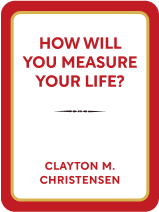

This article is an excerpt from the Shortform book guide to "How Will You Measure Your Life?" by Clayton M. Christensen. Shortform has the world's best summaries and analyses of books you should be reading.
Like this article? Sign up for a free trial here .
Do you need to make a decision about taking a new job? When can taking a new job lead to future success?
Deciding whether to take a new job can be tricky. A new job can lead to great opportunities and success, but it’s important that you make the right decision. In this article, you’ll find out what to consider when taking a new job.
Keep reading to find out whether taking a new job is the right opportunity for you.
Taking a New Job: Types of Career Opportunity
Before we cover how to decide whether to take a job, we’ll look at the different kinds of opportunities you might face in your career. If you’re considering taking a new job, it’s important to know the difference:
1) Anticipated opportunities: These are opportunities you identify and choose to pursue as a deliberate plan.
2) Unanticipated opportunities: These are a combination of problems and opportunities you run into while implementing your deliberate plan. When these unexpected things come up, you must decide whether to stick with the plan, adjust it, or replace it with one of the new options. You may make an outright decision, or an implicit one in which the cumulative impact of daily decisions evolves your plans.
How to Decide Whether to Take a Job
Young people often think they should plan out their careers step by step for the next five years, then stick to their plan. But things change—your career path will constantly present new options and choices. For example, you might have the option to take a new job.
If you want to know how to decide whether to take a new job, the following scenarios might be helpful:
- If you have a job that satisfies both hygiene and motivation factors, then stick with your current job.
- If you’re clear on your goals, and your experience affirms they’re the right ones, focus on your deliberate strategy.
- If your job or career so far doesn’t satisfy both hygiene and motivation factors, adopt a flexible or emergent approach: Try things, learn from experience, and adjust. Keep evolving your strategy until it clicks (until you find work you love and can excel at doing; that is, work that meets hygiene and motivation factors). If you relate to this option, you should consider taking a new job.
You’re unlikely to come up with a fully formed strategy by sitting down and thinking until one pops into your head. It will develop from a combination of planned and unplanned options.
Taking a New Job: An Example
Clayton Christensen’s career path illustrates how unplanned options can become your strategy. He originally aspired to be the editor of the Wall Street Journal. But while he was studying for an MBA at Harvard, a consulting firm offered to help pay the costs if he took a job with them when he graduated. He accepted the offer (an emergent strategy), and he loved consulting work.
After five years there, he and a friend started their own consulting business; investors eventually fired him and installed their own CEO. However, even before being fired, he’d begun considering academia as another potential career. So he entered a Ph.D. program. Becoming a professor became his deliberate strategy (he dropped the idea of becoming the Wall Street Journal editor).
Consider Clayton Christensen’s career decisions described above and how they might apply to your own decision about taking a new job.

———End of Preview———
Like what you just read? Read the rest of the world's best book summary and analysis of Clayton M. Christensen's "How Will You Measure Your Life?" at Shortform .
Here's what you'll find in our full How Will You Measure Your Life? summary :
- How economic theories that help businesses succeed can also help individuals make better life decisions
- How to build a career that makes you happy
- How to deepen your relationships with your spouse and children






